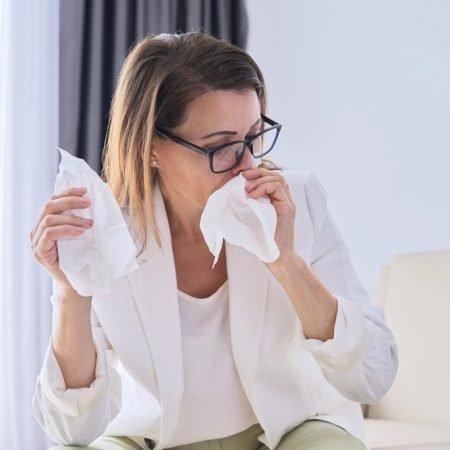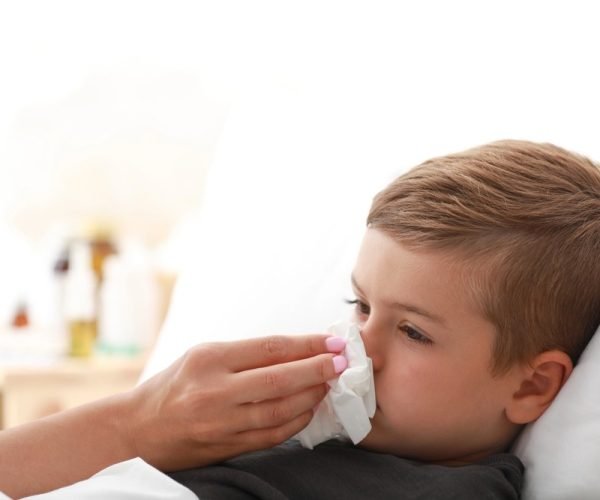Minor Nosebleeds
- Hydrate, Moisturize, Protect
- Simple Steps to Stop Nosebleeds
- Breathe Easy: Prevent Nosebleeds

Minor Nosebleeds
- Hydrate, Moisturize, Protect
- Simple Steps to Stop Nosebleeds
- Breathe Easy: Prevent Nosebleeds

Prevent Discomfort and Pain
Protect Your Health Year-Round
Using a humidifier and nasal moisturizers helps maintain healthy nasal passages, preventing dryness and irritation that can lead to nosebleeds in any season.
Avoid Recurrent Issues
Cost-Effective and Easy Prevention

Minor Nosebleeds: Causes, Treatment, and How NextGen Walk-in Clinic Can Help
Minor nosebleeds are a common issue that can occur for various reasons, ranging from dry air to nasal irritation. While often not serious, they can be unsettling and cause concern. This article will explore the causes, symptoms, treatment options, and how NextGen Walk-in Clinic & Urgent Care can help manage minor nosebleeds effectively.
When to Seek Medical Help for Minor Nosebleeds
Frequent or Recurring Nosebleeds
Prolonged Bleeding
In some cases, minor nosebleeds can last longer than usual. If a nosebleed does not stop after 20 minutes of applying pressure or if the bleeding is unusually heavy, medical attention is required to prevent excessive blood loss and assess the situation.
Severe Bleeding
If the nosebleed is severe, with a large amount of blood or continuous bleeding from both nostrils, it is important to seek emergency care. Severe bleeding may require medical intervention, such as cauterization or packing, to stop the flow of blood.
Other Symptoms
- Difficulty breathing
- Dizziness or lightheadedness
- Excessive weakness
- Blood in the mouth or throat
If any of these symptoms occur alongside a nosebleed, it is important to consult a healthcare professional to rule out any serious conditions.
Underlying Health Conditions
If you have underlying health conditions such as bleeding disorders, high blood pressure, or recent surgery, you may be more prone to experiencing nosebleeds. In these cases, seeking medical advice is important to manage the condition effectively and prevent further complications.

Why Choose NextGen Walk-in Clinic & Urgent Care
At NextGen Walk-in Clinic & Urgent Care, we prioritize your health and convenience with expert care and accessible services. Here’s why you should choose us for your medical needs:
No appointment needed! Whether you’re dealing with a minor nosebleed or any other urgent concern, we provide fast and efficient care whenever you need it.
Our medical team is highly trained and experienced in diagnosing and treating a wide range of conditions, ensuring you get the best care possible.
From routine checkups to urgent care, we offer a broad spectrum of services, including treatment for nosebleeds, allergies, and EENT issues. You can trust us to handle all your healthcare needs.
We offer transparent pricing, with no surprise bills, so you can receive the treatment you need without worrying about financial stress.
We understand the importance of time. With our efficient processes and walk-in availability, we ensure you get the care you need promptly, without long waits.
Choose NextGen Walk-in Clinic & Urgent Care for compassionate, professional, and convenient healthcare, all at your fingertips.
Symptoms of Minor Nosebleeds
Visible Bleeding
The most obvious symptom of a minor nosebleed is blood coming from one or both nostrils. This can range from a few drops of blood to a steady drip. In most cases, the bleeding is not severe, and it can be easily controlled with home remedies.
Slight Irritation or Dryness in the Nasal Passages
Mild Pain or Discomfort
Occasional Swelling
What Are Minor Nosebleeds?
Causes of Minor Nosebleeds
Several factors can trigger a minor nosebleed. Understanding the causes can help prevent future occurrences and allow for quicker resolution when a nosebleed happens.
One of the most common causes of minor nosebleeds is dry air, especially during the winter months when indoor heating can dry out the nasal passages. Dryness causes the delicate blood vessels inside the nose to crack and bleed. This is also why nosebleeds are more common in colder climates or in areas with low humidity.
Blowing the nose, sneezing, or allergies can irritate the nasal passages and cause minor bleeding. When the nasal passages are irritated, the blood vessels become more vulnerable to rupture. This can also happen when someone is congested and needs to forcefully blow their nose.
A light bump to the nose, accidental poking, or even nose picking can cause a minor nosebleed. Since the blood vessels inside the nose are fragile, a slight injury can result in a small amount of bleeding.
Certain medications can contribute to nosebleeds. For example, blood thinners (like aspirin or warfarin) and nasal sprays (such as decongestants or steroid sprays) can increase the likelihood of nosebleeds. These medications may thin the blood or dry out the nasal lining, both of which make it easier for the blood vessels in the nose to break.

Treatment for Minor Nosebleeds
One of the most effective ways to control a minor nosebleed is to pinch your nostrils together (the soft part of the nose) and lean slightly forward. This helps apply pressure to the bleeding vessels and can stop the flow of blood.
• Hold this position for 5-10 minutes without releasing the pressure. This allows time for the blood vessels to clot and the bleeding to stop. Avoid tilting your head back, as it can cause blood to flow down the throat, which may lead to coughing or gagging.
Applying a cold, damp cloth or ice pack to the back of the neck or forehead can help constrict the blood vessels, reducing blood flow to the nose. The cold temperature will also help minimize swelling and soothe the irritated area.
Dry air can be a common cause of nosebleeds, especially in heated indoor environments. To prevent this, use a humidifier in your home to keep the air moist, which helps prevent the nasal passages from drying out and becoming more prone to bleeding.
Saline sprays or gels are effective for moisturizing the inside of the nose. These can be used regularly to prevent dryness and irritation, which are common causes of minor nosebleeds. Using these products can help soothe and protect the sensitive nasal membranes.
Picking your nose or blowing the nose too hard can irritate the delicate blood vessels inside the nostrils, leading to further bleeding. It’s important to refrain from these actions, especially during or after a nosebleed.
Keeping your body hydrated by drinking plenty of fluids helps maintain moisture in the mucous membranes of your nasal passages. Well-hydrated nasal passages are less likely to crack and bleed. Aim to drink water regularly throughout the day to support healthy nasal function.

How NextGen Walk-in Clinic & Urgent Care Can Help
If you're experiencing recurrent or prolonged nosebleeds, our healthcare providers are here to help. We’ll carefully evaluate your symptoms to rule out underlying causes such as clotting disorders, structural issues in the nose, or other medical conditions that may be contributing to frequent nosebleeds.
In some cases, minor nosebleeds may persist despite home treatment. If the bleeding continues, our clinic can provide advanced treatments like cauterization to seal the bleeding blood vessel, providing you with relief and preventing further bleeding.
Our medical team offers personalized advice to help you prevent future nosebleeds. This includes recommendations on humidifiers, nasal moisturizers, and adjusting medications that may contribute to dryness or irritation in the nasal passages. We want to help you reduce the likelihood of recurring issues.
At NextGen Walk-in Clinic & Urgent Care, we understand that nosebleeds can happen at any time. Our walk-in clinic provides immediate access to care without the need for an appointment. Whether it's a one-time occurrence or a recurring problem, we are here to provide treatment, advice, and reassurance to help you manage your symptoms.
Our clinic specializes in EENT (Eyes, Ears, Nose, and Throat) care, offering expert treatments for a wide range of conditions. In addition to nosebleeds, we treat allergies, sinus infections, ear problems, and other nasal and throat issues, providing comprehensive care to ensure your overall well-being.
Preventing Future Nosebleeds
Hydrate and Moisturize
How STDs Are TransmUse a Humidifier itted
Protect the Nasal Passages
If you’re going to be in a particularly dry or cold environment, consider using a face mask or applying a nasal moisturizer. This will help shield your nasal passages from the drying effects of the environment, providing an additional layer of protection against irritation and bleeding.
Limit Nasal Irritation
Customer Reviews for NextGen Walk-in Clinic & Urgent Care

Catherine L.

Lloyd A.

Deanna J.

